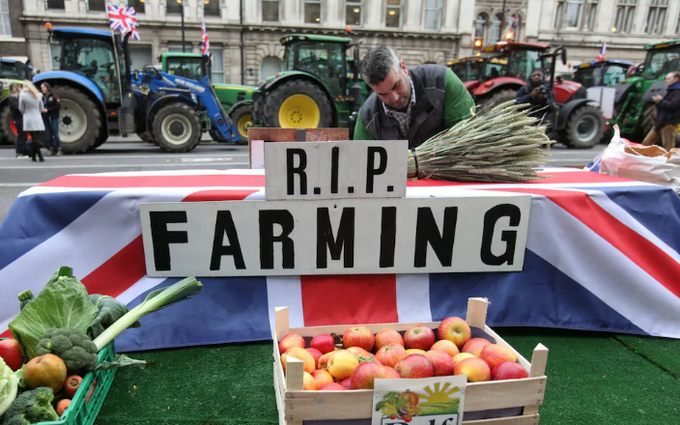December 30, 2025 | 16:51 GMT +7
December 30, 2025 | 16:51 GMT +7
Hotline: 0913.378.918
December 30, 2025 | 16:51 GMT +7
Hotline: 0913.378.918

Farmers are already under pressure following the Chancellor’s inheritance tax raid Credit: Zuma Press/Alamy.
Britain’s farmers are braced for £600m of collective losses after poor weather led to the second-worst harvest on record.
According to figures from the Department for Environment, Food and Rural Affairs, the UK’s harvested wheat crop plunged to 11.1m tonnes in 2024, down from 14m the year prior.
It marks the latest blow to Britain’s farmers, who are already under mounting pressure following the Chancellor’s inheritance tax raid.
The latest harvest is the second-smallest in records dating back 25 years, with only 2020 performing worst during the pandemic.
Poor weather bears much of the blame, as it hampered farmers’ ability to sow and also damaged growing conditions.
However, the acreage growing wheat also plunged by 11pc.
Tom Lancaster, from the Energy and Climate Intelligence Unit, estimated that poor harvests have put a £600m hole in farmers’ revenues this year.
He said: “This year’s harvest was a shocker, and climate change is to blame. Whilst shoppers have been partly insulated by imports picking up some of the slack, Britain’s farmers have borne the brunt of the second-worst harvest on record.
“It is clear that climate change is the biggest threat to UK food security. And these impacts are only going to get worse until we reduce our greenhouse gas emissions to net zero, in order to stop the warming that is driving these extremes.”
Yet it was not only wheat that struggled over the past year, as other crops were also affected.
Matt Daragh, from the Agriculture and Horticulture Development Board, said: “Following the wettest September to May on record last season, cereal and oilseed rape production in the UK was considerably challenged, particularly winter sown crops.
“While most spring crops fared better, according to today’s figures, total production of wheat, barley, oats and oilseed rape contracted by 13pc on the year in 2024 to 20.0m tonnes.”
It comes after farmers this week blocked major roads and protested outside Parliament in an attempt to persuade the Government to reverse plans to impose inheritance tax on agricultural land and businesses.
The Agricultural Property Relief, which allows family farms to be passed down without inheritance tax, is being curtailed from April – raising fears for the future of the industry.
Tom Bradshaw, the president of the National Farmers Union, warned MPs this week that some farmers may contemplate suicide.
Under the incoming changes, farmers will be able to pass land to their children tax-free, but only if the parent survives for at least seven years after passing on the property.
“Those people that are in ill health or don’t believe they are going to live for seven years may well decide that they shouldn’t be here on April 2026,” Mr Bradshaw said.
telegraph

(VAN) From emissions cuts to energy sovereignty, France’s president reflects on COP21's legacy.

(VAN) A Yale University poll from earlier this month says most Americans see climate change as playing a role in hurting prices and the cost of living.

(VAN) According to the National Food and Strategic Reserves Administration, this year's autumn grain entered the market earlier and boasts good quality.

(VAN) The Trade Policy and Strategy Office (TPSO) under the Commerce Ministry reported that exports in November 2025 were worth US$27.445 billion, expanding for a 17th consecutive month at 7.1%.

(VAN) Ukraine’s leading poultry processor and exporter, MHP, plans to kick off a trial production of insect meal in the first quarter of 2026, as revealed by Serhiy Melnychuk, scientific advisor to the chairman of MHP.

(VAN) Researchers have warned of the unexpected consequences of extremely hot, humid conditions during pregnancy.

(VAN) A group of Iranian scientists from the National Institute of Genetic Engineering and Biotechnology claimed that they have developed a technology that allows effective processing of poultry feathers into meal using a Bacillus strain.